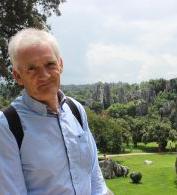Regeneration after bushfires could be compromised by climate change, research shows.
Scientists from the University of Tasmania’s School of Natural Sciences looked at how certain chemicals, produced by bushfires and crucial to stimulating new plant growth, respond to warming temperatures.
In particular, researchers studied karrikins, which are among the most important group of chemicals which stimulate the germination of seeds of many types of plants following a bushfire.
Professor Steven Smith (pictured) and Dr Lu Wang found karrikins will only stimulate seed germination under conditions which favour seedling growth and establishment.
Using the study species Arabidopsis thaliana (also known as thale cress), Dr Wang found that if the temperature is too high, or if the seed experiences water deficit during exposure to karrikins, seed germination is inhibited rather than stimulated.
Despite the scenes of blackened landscapes following bushfires, we know that new plant growth will soon emerge and that before too long the green landscape will return.
“Our study found that even a few degrees above the optimum germination temperatures, karrikins can inhibit seed germination.
“If this discovery holds true for fire-following species more broadly, it could point to serious consequences for landscape recovery after bushfires as we experience more frequent warm periods due to climate change.”
Professor Smith’s latest findings build on his pioneering research in the field, as it was his team who originally discovered the mechanism by which chemicals, produced by bushfires, stimulate germination of dormant seeds.
“We might find that landscapes experiencing warmer weather following a bushfire, might show poor seed germination and reduced species diversity, resulting in less effective landscape regeneration,” Professor Smith said.
These findings argue for further research to determine the impact of this response of seeds to karrikins in natural environments, and to find ways to better manage regeneration after fires.
The research paper,
‘Karrikin-KA12 signalling provides Arabidopsis seeds with tolerance to abioticstress and inhibits germination under conditions unfavourable to seedling establishment’, was published in the prestigious journal New Phytologist.
Interested in conducting your own research? Apply now to become a research student.
